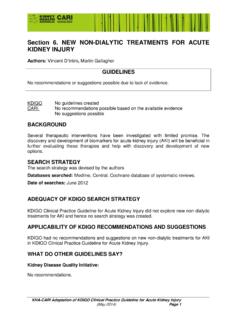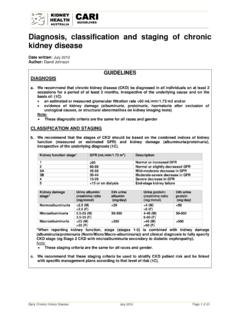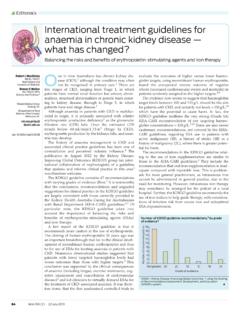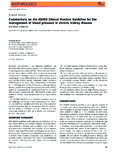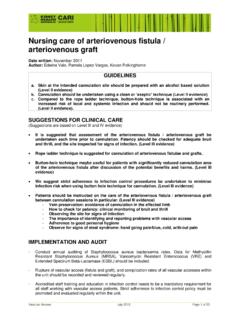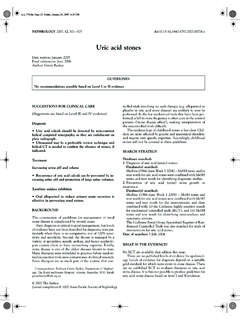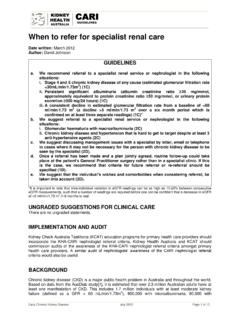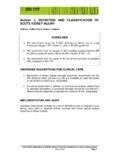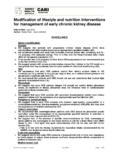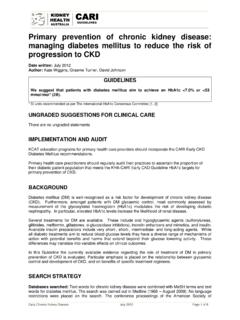Transcription of Primary prevention of chronic kidney disease: …
1 _____Early chronic kidney Disease July 2012 Page 1 of 18 Primary prevention of chronic kidney disease: modification of lifestyle factors Date written: July 2012 Author: Kate Wiggins, David Johnson GUIDELINES Weight management a. We suggest the maintenance of a stable (within 5%), healthy weight as it is associated with a lower risk of developing chronic kidney disease (2C) b. We suggest, where weight loss is required, the use of medications such as topiramate (if available) in conjunction with a non-pharmacological weight loss programme to increase weight loss and reduce the risk of developing chronic kidney disease (2B) Dietary modification c. We suggest adherence to a low salt diet (<100 mmol or 2300mg/ day) to reduce the risk of developing chronic kidney disease (2C) d. We suggest a normal dietary protein intake, as the relative benefits versus harms of dietary protein restriction has not been adequately established (2D) Lifestyle modification e.
2 We recommend avoidance or cessation of cigarette smoking to reduce the risk of developing chronic kidney disease (1D) f. We suggest that patients with identified excessive alcohol consumption should receive psychological support and interventions to minimise excessive intake (2D) g. We suggest that patients be encouraged to undertake regular physical exercise to reduce the risk of developing chronic kidney disease. Exercise needs to be appropriate for their physical ability and medical history (2C) UNGRADED SUGGESTIONS FOR CLINICAL CARE There are no ungraded statements. IMPLEMENTATION AND AUDIT KCAT education programs for Primary health care providers should incorporate the CARI early CKD lifestyle modification recommendations. BACKGROUND chronic kidney disease (CKD) is associated with considerable morbidity and increased mortality risk.
3 Biochemical evidence of CKD (reduced estimated GFR, elevated serum creatinine) usually indicates the presence of tubulointerstitial fibrosis within the kidney . Such pathology is irreversible, therefore the aim of treatment in many patients with CKD is to delay progression of disease rather than achieve a cure. In light of this it is clear that implementation of Primary prevention measures to avoid development of CKD is a preferable strategy. Whilst much information is available about risk factors for development of CKD (refer to early CKD CARI Guideline 1) it is less clear whether risk factor modification prevents development of CKD. The aim of this guideline was to evaluate currently available clinical evidence of interventions relevant to lifestyle modification in the Primary prevention of CKD.
4 In this guideline prevention of CKD is defined as a normal serum creatinine, eGFR above 60 mL/minute and absence of urinary albumin, protein or haematuria. _____ early chronic kidney Disease July 2012 Page 2 of 18 SEARCH STRATEGY Databases searched: Text words for chronic kidney disease were combined with MeSH terms and text words for weight management (caloric intake, obesity), dietary therapy (potassium, phosphate, sodium, protein) and lifestyle management (alcohol, smoking, exercise, drinking). The search was carried out in Medline (1966 August 2009). No language restrictions were placed on the search. The conference proceedings of the American Society of Nephrology from 1994-2008 were also searched for trials. An updated search was conducted in Medline (2009 2012) using the same text words and MeSH terms.
5 Date of search/es: 25 August 2009 and May 2012. WHAT IS THE EVIDENCE? Management of obesity in Primary prevention of CKD Maintenance of a stable weight in the Primary prevention of CKD Obesity and the metabolic syndrome are well recognised as risk factors for the development of CKD (refer to Guideline 2 Risk Factors for early CKD). It is less clear whether maintenance of a healthy weight prevents the development of CKD. Ryu et al. followed 8792 healthy Korean men (mean age years) with no known risk factors for CKD [1]. Subjects were followed from 2002 to 2007 with a total of 35, person-years of follow-up. CKD, defined as an eGFR <64 mL/ min/ , developed in 427 subjects. Change in weight over the study period was considered as a categorical variable according to change in BMI in kg/m2/year (< , , , , ).
6 Weight change as a time-dependent variable was significantly related to CKD incidence following adjustment for age, baseline GFR and BMI, HDL, FBG, uric acid, regular exercise and incident hypertension (adjusted hazard ratio (95% confidence interval) ( )). Change in weight was found to have a U-shaped relationship with risk of developing CKD. The risk of developing CKD was greatest in people with < or > kg/m2/year (adjusted HRs ( ) and ( ) respectively). The relationship between change in weight and risk of CKD persisted even if people remained within the same categorical group of BMI. A similar result was found in a cohort of participants in the Physicians Health Study, a randomised trial of aspirin versus beta-carotene in the Primary prevention of cardiovascular disease and cancer [2].
7 A total of 11,104 initially healthy males had a follow up serum creatinine level on average 14 years after their baseline assessment. BMI was calculated from self-reported weight. The relationship between change in BMI and development of CKD was evaluated in 10,906 men. The OR for developing CKD (GFR <60mL/ or serum creatinine 133 mol/L) was (95% CI ) in men whose BMI increased by >10% compared to those with a stable BMI (within 5% of baseline). Weight loss and 10% of weight gain were not associated with increased risk of CKD. The relationship between >10% increase in BMI and development of CKD persisted within each category of BMI (normal or kg/m2, overweight or kg/m2, and obese or 30 kg/m2) but was strongest in obese patients. Afshinnia et al [3] reported the results of a meta-analysis of 522 subjects from 5 controlled and 8 uncontrolled trials published in English prior to June 2009 in which urinary protein was examined among obese or overweight adults before and after weight loss interventions including dietary restriction, exercise, anti-obesity medications and bariatric surgery.
8 After excluding one study which greatly increased heterogeneity in the pooled analysis, weight loss interventions were associated with a decrease in proteinuria by g (95% CI g), representing a 55% decrease from baseline (95% CI 23%-87%), Heterogeneity testing demonstrated a moderate degree of heterogeneity (I2 = ) that almost achieved statistical significance (p = ). Meta-regression analysis suggested that this heterogeneity may have been partially explained by variation in baseline weight, weight loss and decline of mean arterial pressure among different studies. Weight loss interventions also decreased urinary albumin excretion by 14 mg (95% CI 11-17), representing a 52% decrease from baseline (95% CI 40%-64%). This finding was again associated with moderate heterogeneity (I2 = , p= ).
9 Subsequent meta-regression analysis demonstrated that each 1 kg weight loss was associated with 110 mg (95% CI 60-160 mg, p< ) decrease in proteinuria and mg (95% CI, to mg, P = ) decrease in microalbuminuria. Surgical interventions decreased GFR or creatinine clearance by mL/min (95% CI, to ), representing a 17% decrease from baseline (95% CI, 8% to 26%). _____ early chronic kidney Disease July 2012 Page 3 of 18 Non-surgical interventions were not significantly associated with changes in GFR or creatinine clearance. The conclusions that could be drawn from this systematic review were limited by significant trial heterogeneity, generally poor trial quality, inclusion of non-randomized studies, inclusion of different populations at different stages of disease (both with and without CKD) and failure to account for the impact of weight on GFR estimating equations.
10 Weight loss in the Primary prevention of CKD Stenlof et al. conducted a randomised, double-blinded, placebo-controlled, multicentre trial of pharmacological therapy with immediate-release topiramate in conjunction with a non-pharmacological weight loss programme (Pathways to Change ) [4]. Two doses of topiramate, 96 mg/day and 192 mg/day, were studied. All patients had newly diagnosed type 2 diabetes mellitus (DM), were na ve to glucose-lowering therapy, and were obese (BMI 27-50 kg/m2). Baseline urinary albumin excretion (UAE) was , and hrs. for placebo, low- and high-dose topiramate groups respectively. The study was terminated early due to the study drug being discontinued by the manufacturer (so as to permit development of a controlled release formulation).
